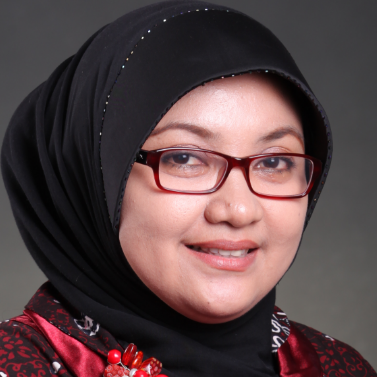
Ema Utami
Work place: Magister of Informatics Engineering, Universitas Amikom Yogyakarta, Yogyakarta, 55281, Indonesia
E-mail: emma@nrar.net
Website:
Research Interests: Computer systems and computational processes, Natural Language Processing, Database Management System, Data Structures and Algorithms, Analysis of Algorithms
Biography
Ema Utami was born in Lampung, on February 21, 1975. She received bachelor, master and doctoral degrees in computer science from Universitas Gadjah Mada, Yogyakarta, Indonesia in 1997, 2002 and 2010 respectively. Since 1998 she has been a lecturer and researcher in Universitas Amikom Yogyakarta. Since 2010 she has been a vice director in magister of informatics engineering in Universitas Amikom Yogyakarta. She has wrote more than 15 computer science related books and published nationally. Prof. Dr. Ema Utami, S.Si, M.Kom is member of several professional societies such as IEEE, IAENG, MASTEL and also as secretary general of national professional societies, IndoCEISS. Her current research interest area are natural language processing, intelligent systems, computer algorithms and database programming.
Author Articles
Determination of Status of Family Stage Prosperous of Sidareja District Using Data Mining Techniques
By R Bagus Bambang Sumantri Ema Utami
DOI: https://doi.org/10.5815/ijisa.2018.10.01, Pub. Date: 8 Oct. 2018
Family welfare is a family formed in legitimate marriage, spiritual needs and material worthy, devoted to God YME, have a harmonious relationship, harmonious and balanced with society and the environment. The government has implemented various family development programs prosperous. To support this, every year the government implements the family data collection process. Family data collection is considered an important step because it has many functions, primarily to understand the target group and to determine solutions to solve the problems of each target group. The search or discovery process of information and knowledge contained in the number of data can be done with data mining technology. Data mining is a term used to describe the discovery of knowledge in a database. In this case data mining can be used to determine the status of the prosperous family stage. The K-Nearest Neighbor (KNN) method, the Naive Bayes method and the Principal Component Analysis (PCA) are used for the proper classification of status stages. Based on the test results, the performance test of classification algorithm for case of determining status of prosperous family of Sidareja District for Naïve Bayes method using confusion matrix obtained 98.12% accuracy after added PCA feature selection to 97.73% while KNN method obtained accuracy of 98.86%, then after added PCA feature selection increased to 98.96%.
[...] Read more.Design Concept Integration Tax Payment System with Implementing Financial Technology
DOI: https://doi.org/10.5815/ijieeb.2018.05.03, Pub. Date: 8 Sep. 2018
Taxation has an important role as state revenue in the State Budget. In 2017, the target of tax revenues in the State Budget is about Rp. 1,498.9 trillion so that the Ministry of Finance of the Republic of Indonesia contrives as well as possible through the fiscal policy reform to fulfill the targets. One of the efforts which undertaken by the Directorate General of Taxes is applied tax payment system using e-billing with the electronic deposit slip. E-billing (electronic billing) is an online service which uses the system through the issued code on a kind of tax payment. The tax payment system is based on self-assessment to make deposits or tax payments independently by the taxpayer. Developments in technology influenced the emergence of innovations particularly financial technology in the finance industry. An industry which worked in the finance sector utilizing financial technology in the payment system. This kind of condition can provide opportunities for financial transaction service electronically. In this research proposed a tax payment system design which can be integrated with financial technology industry through Service Oriented Architecture (SOA) approach. The design which included in this paper is technology architecture, data modeling, use case diagram of service and system integration design. A conceptual design is realized as an effort to utilize financial technology to provide alternative tax payment transactions in achieving the target of state revenue.
[...] Read more.Decision Support System Performance-Based Evaluation of Village Government using AHP and TOPSIS Methods: Secang Sub-district of Magelang Regency as a Case Study
By Vickky Listyaningsih Ema Utami
DOI: https://doi.org/10.5815/ijisa.2018.04.03, Pub. Date: 8 Apr. 2018
The increasing of village grants provider growth opportunities for villages every year. The Reliable performance of village governance is the main factor that determines the development of a village. In Secang, there are still many rural governance performances that are not optimal yet, therefore we need a system of performance evaluation of the village government. Decision support systems with a combination of AHP and TOPSIS models can be used to help evaluating performance village Government. AHP method is used to perform the weighting of the criteria and TOPSIS methods to make a ranking system of the performance evaluation of village government. AHP was chosen because it has many advantages of computation weighting while TOPSIS was efficient and able to measure the relative performance in a simple mathematical form. One advantage of the system that was built is the dynamic nature of the assessment criteria used for the calculation process, with menus for assessment criteria period the user can add or reduce the assessment criteria in accordance with the requirements or regulations. Output of DSS Village Government Performance Evaluation is village government performance ratings that can be used as a consideration in determining rewards and assistance to the village from the sub-district. From the test results on ranking and prototype, 86.67% of users agree that the prototype can be implemented and used to evaluate the performance of village government in the Secang sub-district.
[...] Read more.Other Articles
Subscribe to receive issue release notifications and newsletters from MECS Press journals